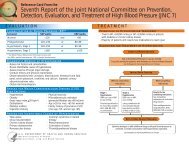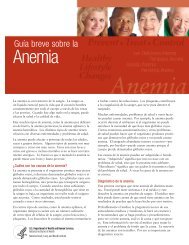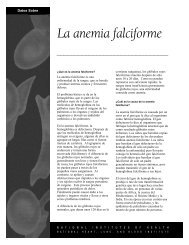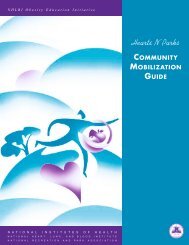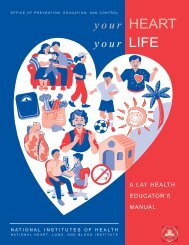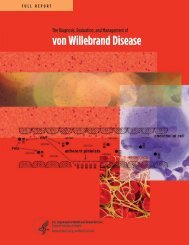WOMEN 'S HEALTH AND MENOPAUSE : - National Heart, Lung ...
WOMEN 'S HEALTH AND MENOPAUSE : - National Heart, Lung ...
WOMEN 'S HEALTH AND MENOPAUSE : - National Heart, Lung ...
You also want an ePaper? Increase the reach of your titles
YUMPU automatically turns print PDFs into web optimized ePapers that Google loves.
Alzheimer’s disease from, for example, genetic<br />
predisposition or a strong family history in firstdegree<br />
relatives, may wish to consider ERT if<br />
other potential benefits of treatment are not exceeded<br />
by well-recognized potential risks. Decisions<br />
concerning estrogen dosage, timing, and treatment<br />
duration should be guided by other medical considerations;<br />
the literature on Alzheimer’s disease<br />
allows no consistent guidance. On the basis of data<br />
from a small number of RCTs, 77,78 estrogen<br />
monotherapy is not useful for the treatment of<br />
dementia in women diagnosed with Alzheimer’s<br />
disease. Short-term side effects, including venous<br />
thrombosis, 75 breast tenderness, and withdrawal<br />
bleeding, are particularly worrisome in that population.<br />
Few data address estrogen effects in forms<br />
of dementia other than Alzheimer’s disease.<br />
2.3 Other Neurologic Disorders<br />
2.3.1 Stroke<br />
Stroke refers to brain disease caused by ischemic<br />
or hemorrhagic abnormalities in the vascular supply<br />
to the brain. (See ch. 8, sec. 7.) The incidence of<br />
stroke varies widely from country to country. 84 Its<br />
incidence rises dramatically with age, and worldwide,<br />
stroke is the second leading cause of death. 85<br />
In the Framingham Study in the United States,<br />
rates for ischemic stroke are lower in women than<br />
men. 84 Atherosclerosis in arteries that supply blood<br />
to the brain predisposes to cerebral infarction. 86<br />
Estrogen may reduce these atherosclerotic<br />
changes, perhaps due to favorable effects on the<br />
serum lipid profile and vascular endothelial function.<br />
(See ch. 8, sec. 3.2 and sec. 4.1.1). 87,88<br />
Estrogen increases cerebral blood flow in humans. 89<br />
In rats, estrogen reduces the extent of brain damage<br />
caused by acute infarction. 81–83<br />
In a number of observational studies, HRT is associated<br />
with reductions in risk for stroke death of<br />
20–60 percent. 90 However, even in analyses<br />
restricted to ischemic stroke, HRT does not appear<br />
to reduce stroke incidence. 91,92 This conclusion is<br />
supported by secondary analyses in a large clinical<br />
trial among postmenopausal women with CHD;<br />
after a mean followup of 4 years, HRT had no<br />
effect on stroke risk. 93<br />
Among relatively younger women in the Nurses’<br />
Health Study, current hormone use was associated<br />
with higher risk of ischemic stroke. 91 There is good<br />
evidence that treatment of hypertension, the use of<br />
statins after MI, and carotid endarterectomy in<br />
patients with severe stenosis can reduce the risk of<br />
a first ischemic stroke due to atherothrombotic<br />
disease. 94 Because ERT may increase short-term<br />
cardiovascular risk, 93 there is a need for caution in<br />
beginning estrogen after recent ischemic stroke.<br />
2.3.2 Epilepsy<br />
Epilepsy is a CNS disorder<br />
characterized by recurrent<br />
seizures. Epilepsy often begins<br />
in early life but can start at any<br />
age. Causes are legion. In rats,<br />
estrogen increases the excitability<br />
of hippocampal neurons95 and exacerbates epilepsy by lowering the seizure<br />
threshold; 96 epileptogenic effects may be opposed<br />
by progesterone. 96 In women with so-called catamenial<br />
epilepsy, seizures tend to recur immediately<br />
preceding or during menstruation and are thought<br />
to be triggered by fluctuations in concentrations of<br />
ovarian hormones. 97 Catamenial seizures can occur<br />
during other phases of the menstrual cycle as<br />
well. 98 The use of estrogen-containing OCs does<br />
not increase seizure frequency. 99 Effects of<br />
menopause on epilepsy have not been well studied.<br />
Based on limited questionnaire data, epileptic<br />
women probably would not experience a change in<br />
seizure frequency or severity with menopause, but<br />
HRT may increase seizure frequency. 100,101<br />
Stroke incidence,<br />
however, is not<br />
closely associated<br />
with the use of HRT.<br />
2.3.3 Migraine<br />
Migraine is a common disorder characterized by<br />
recurrent attacks of throbbing headache. Pain is<br />
often unilateral and is sometimes preceded by<br />
focal neurologic symptoms and accompanied by<br />
gastrointestinal symptoms. A questionnaire study<br />
257



